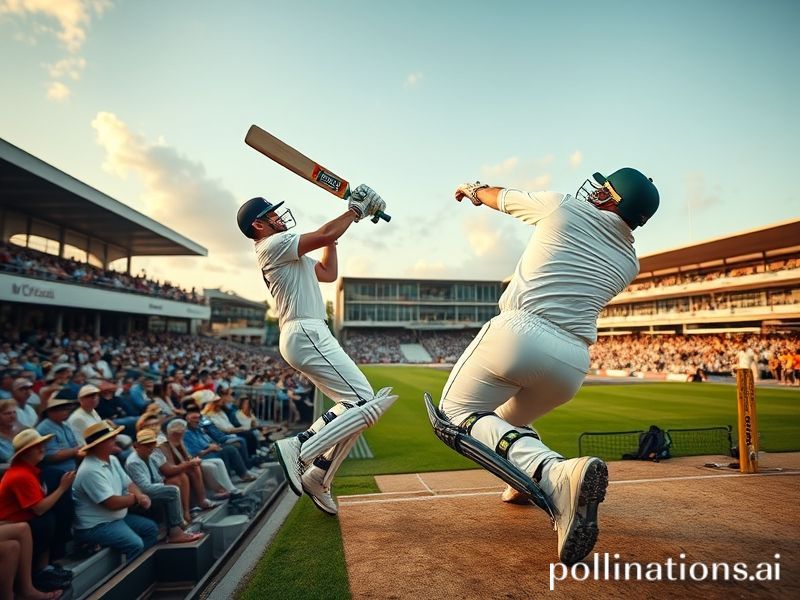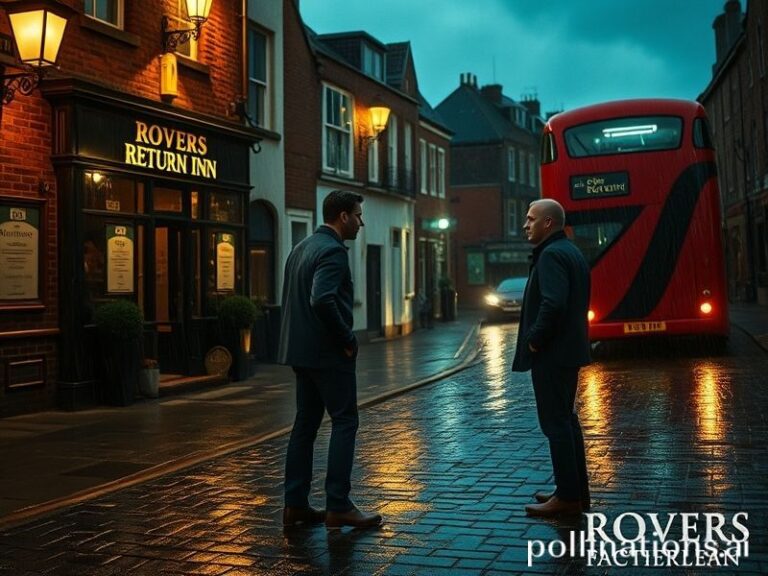England vs South Africa: When Cricket Becomes the World’s Most Polite Balance Sheet
England v South Africa: A Rivalry Where Colonial Ghosts Keep Score
By Our Man in the Stands, Pretoria—still waiting for the Wi-Fi to load the 19th century
The Oval, London, June 2030. A low sky the colour of wet cardboard hangs over the ground while two former empires—one shrunk to a damp island that can’t even keep its own prime minister for a full fiscal quarter, the other a rainbow nation that keeps the lights off to stay fashionable—attempt to convince the planet that 22 men in woolly cream sweaters are a metaphor for geopolitics. Spoiler: they are.
For the uninitiated, England versus South Africa looks like sport. To everyone else, it’s a quarterly audit of who still owns whom. When the Barmy Army sings “Jerusalem” they’re not asking for the construction of a celestial city; they’re humming a reminder that the ECB’s broadcast rights are still denominated in pounds sterling, the same currency that once financed Cecil Rhodes’ train set across the continent. Meanwhile the Proteas—named after a flower that survives wildfires—swagger out to a wicket so dry it could be sold by the gram in Amsterdam, proof that even the pitch is undergoing its own stage-four drought policy.
The match matters because cricket is the only game that schedules lunch, tea, and existential dread. India and China may trade missiles of rare-earth tariffs, but here the ammunition is reverse swing and racial-transformation quotas. England picks a team that looks like a minor royal wedding: one Irish guy for the craic, a reformed Kolpak who now pronounces “castle” correctly, and a leg-spinner who went to the same Oxford college that taught half the cabinet how to misplace PPE contracts. South Africa counters with a squad so transformed that the average batting order has more identity documents than the Home Office, and still the UK press asks whether politics should really “interfere” with selection—presumably preferring the good old days when selection was decided by whether your grandfather owned a mine.
Globally, the series is being live-streamed in 178 countries, mostly by insomniacs who’ve already binged everything on Netflix including the Kurdish remake of Emily in Paris. In Mumbai, traders stop dumping the rupee to watch Jofra Archer crank up 95 mph bouncers, each delivery a reminder that the IPL auction is only four months away and somebody’s yacht fund needs topping up. In Sydney, gamblers hedge the over-under on how many overs until the ball is swapped because “it went out of shape,” a euphemism so English it ought to be served with scones. And in Beijing, party cadres monitor the Duckworth-Lewis method for tips on how to recalibrate GDP when it rains.
Back in the stands, the atmosphere is what you’d expect if Wimbledon let hooligans in. A group of South African fans wearing bright green morph suits—presumably to hide the electricity bill shock waiting at home—break into shouts of “Bokke!” before remembering that’s rugby and sheepishly switch to “Prooooo-tea!” which sounds like a retirement fund collapsing. Their English counterparts retaliate by attempting the conga, a dance last relevant when interest rates were single-digit. Somewhere in the middle, a neutral American tourist asks why the game stops for “drinks” twice an hour and is politely told it’s hydration, not intervention; he shrugs, buys another 12-pound craft IPA, and tweets that cricket is “baseball on Valium.” The tweet goes viral; Boeing’s stock dips 3 %.
On the field, the real ledger is being balanced. Every boundary is a remittance: England’s broadcast deal pumps 220 million pounds into the game, of which 11 % trickles down to associate nations like Scotland, who still have to practise in a car park next to a deep-fried Mars bar stand. South Africa’s Graeme Smith, now a suit instead of a sledging opener, negotiates reciprocal touring agreements that will send the team to Pakistan, Sri Lanka, and possibly the International Space Station—anywhere the Rand is still legal tender for oxygen. Meanwhile, a 19-year-old township kid with a bowling action like a young Ntini takes two for 27 and is immediately head-hunted by three counties, two IPL franchises, and one Saudi start-up promising “Halal T20” under a retractable dome in Neom. He has never seen snow, but Lancashire has already offered him a flat above a curry house and a gig as the face of their new NFT collection, “Burnley Meta-Lions.”
By stumps on day one, South Africa are 278 for five, the pound is down a cent, the Rand is up on improved terms of trade, and the UN Security Council has tabled a motion to replace veto powers with Super-Over shootouts. Everyone agrees it’s the most civilised way to decide who still gets to write history books.
And that, dear reader, is why a cricket match in June matters: because the scorecard is the only spreadsheet left that both sides still believe. Everything else—GDP, carbon credits, vaccine patents—has grown too abstract, too decimal. But 98 for four on a wearing pitch? That’s truth you can taste, like blood in your mouth or empire in your tea. The game will end, the players will shake hands, the trophy will be hoisted by someone who wasn’t alive for apartheid or Live Aid. Then we’ll all fly home, secure in the knowledge that whoever won, the real victor is the same as always: the broadcast conglomerate charging by the minute for the privilege of watching ghosts keep score.







